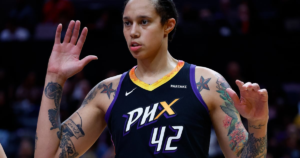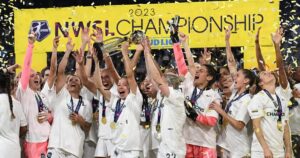Australia’s first female astronaut, Katherine Bennell-Pegg, graduated from the European Space Agency’s (ESA) training program on Monday evening.
She’s unlikely to take a giant leap into space anytime soon, but is on a mission to strengthen the space industry and inspire women and girls.
Bennell-Pegg, the Australian Space Agency (ASA) director of space technology initially missed out on a coveted spot in ESA’s astronaut training program, but the Europeans were impressed enough to offer her a position, paid for by the Australian government.
ASA paid $466,000 for her to spend a year at the European Astronaut Center in Cologne, Germany.
This helped her become not only the first female Australian astronaut, but the first person to become a qualified astronaut under the Australian flag. Dr. Andy Thomas and Paul Scully Power both went to space as American citizens.
Bennell-Pegg received centrifuge, survival and medical training, experienced weightlessness through parabolic flights, and learned about space systems engineering and robotics and scientific experiments.
The head of the Australian Space Agency, Enrico Palermo, said her training had “opened doors” and that she would return “full of knowledge, insights and connections”.
“Sending humans into space is about more than just exploring. It enables us to do unique science, unlock knowledge and develop technology that benefits life on Earth – from new medicines and health breakthroughs to how we grow food and conserve water,” he said.
Bennell-Pegg said it was “an honor to be the first”. “And I’m determined not to be the last,” she said.
“Graduating as an astronaut with the Australian flag on my shoulder represents the hard work, innovation and ambition of everyone back home: a growing industry of scientists, engineers, educators and more.”
She also pointed to the opportunities to “drive our country’s science and technology forward… and to raise the level of aspiration for the next generation”.
“I hope my training and whatever comes next helps pave the way for more Australians to get involved in human spaceflight,” she said.
The spending has raised some questions about what Australia is getting in return for that money and the selection process.
The Department of Industry and Science, which oversees the space agency, said Bennell-Pegg would be qualified for assignment to the International Space Station (ISS) after her graduation on Monday night.
However, Bennell-Pegg is not one of the five astronauts that ESA plans to send to the ISS. This means she will have to go private unless a country with a human spaceflight program decides to send her.
Getting to the ISS privately would cost an estimated $55 million, almost twice the Australian Space Agency’s annual budget, which is $34.2m.
According to the agency, Bennell-Pegg applied privately when the ESA advertised a candidate astronaut intake in early 2021.
ESA announced in November 2022 that it had selected 17 candidates from more than 22,500 applicants – five astronaut candidates and 12 astronaut reserves. Bennell-Pegg was not one of the 17. Then it offered her the paid position.
The department and the agency highlighted the expertise Bennell-Pegg would bring back to Australia from her ESA training, her role in advancing science and the space industry as well as inspiring young men and women and strengthening the European/Australian relationship.
to newsletter promotion
Greens senator David Shoebridge questioned the government’s plans.
In questions on notice, he asked Industry and Science Minister Ed Husic whether the government was considering setting up a human spaceflight program and whether it was considering funding a seat on a private astronaut mission, and how much it would would cost
“As the position of astronaut is an extremely high-profile, highly competitive public sector employee position, does the agency have any plans to conduct a selection process for ‘Australia’s Official Astronaut’ open to all citizens, not just those who dual citizens of other nations with their own human spaceflight programs?” he asked in a Senate question on notice.
Bennell-Pegg is a dual British citizen, and the UK Space Agency is working with Axiom Space on a UK human space mission.
In March this year, Australia sent a space delegation to Axiom Space, which hosts private astronaut missions to the ISS. In 2018, Axiom said 15 weeks of training and a 10-day mission to the ISS would be $55 million.
The Australian Space Agency said it did not plan to establish a human spaceflight program or consider a private astronaut mission, and that ESA offered the site specifically to Bennell-Pegg.
The Australian Space Agency said the training was an “exceptional opportunity to promote STEM education and careers in Australia, particularly for women”; to gain insights into spaceflight and space-based technology; and to help Australian industry and researchers collaborate with ESA.
“Ms Bennell-Pegg will return to the Australian Space Agency with insights and expertise, including in relation to space launch and returns, industry collaboration and supply chains, and STEM workforce development for space-related applications,” it said in a statement.
Space Industry Association of Australia executive chairman Jeremy Hallett said he would like to see Bennell-Pegg on a flight in the short term. He also wanted Australia to have a human spaceflight program in the long term.
“[Her graduation] is important to space in Australia, but I would suggest that this is just the beginning – her journey will only be complete once she is in space,” he said.
“She will have a lot to bring back to Australia in terms of outreach.”





